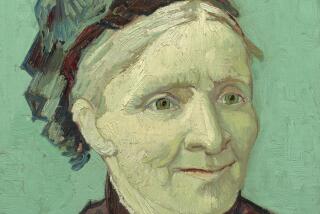Richard Wollheim, 80; Wrote About Art and Psychoanalysis
- Share via
LONDON — Richard Arthur Wollheim, a philosophy professor whose writing on visual art and psychoanalysis made him one of the field’s most innovative thinkers, has died. He was 80.
Wollheim died Tuesday of heart failure at his home in London, according to Alan Code, who succeeded him last year as chairman of the UC Berkeley philosophy department when Wollheim retired to his native England.
Focused on psychoanalysis, Wollheim wrote authoritatively on Freudianism, including his 1971 biography, “Sigmund Freud.”
He also explained his own philosophy in such books as “The Mind and Its Depths” in 1993 and “On the Emotions” in 1999.
But it was his ideas about painting that most made him unusual among philosophers.
Wollheim set out his views in “Painting as an Art,” published in 1987 and delivered as part of the 1984 A.W. Mellon lectures in the fine arts at the National Gallery of Art in Washington.
The philosopher described gazing for hours at paintings to shed preconceptions and find the works’ true emotional content, a technique he called “seeing in.” Doing so could enable viewers to glimpse what an artist meant to convey, both consciously and unknowingly, he said.
“Intention must be taken to include desires, beliefs, emotions, commitment, wishes,” he wrote.
Wollheim insisted that art must be viewed in the context of the full spectrum of human psychology and emotion, not oversimplified with critical or overly academic analysis.
He wrote widely about painting and was credited with coining the term “Minimalism” in his 1965 essay “Minimal Art,” about monochromatic painting and Marcel Duchamp’s piecing together of everyday objects into artworks. Wollheim’s 1968 book, “Art and Its Objects,” also won high praise.
Another of his books, edited by Rob van Gerwen, was “Richard Wollheim on the Art of Painting: Art as Representation and Expression,” published in 2001.
Wollheim also wrote the 1969 novel “A Family Romance,” “The Good Self and the Bad Self” in 1976, “The Sheep and the Ceremony” in 1979 and “Formalism and Its Kinds” in 1995.
Born in London, he studied history and philosophy, politics and economics at Oxford University and served as a captain in the British army from 1942 to 1945, fighting mostly in France.
He taught philosophy at University College London from 1949 to 1982 and directed the department, starting in 1963.
He then took up a post at Columbia University and began teaching at Berkeley in 1985.
Wollheim was a fellow in the American Academy of Arts and Sciences and the British Academy. He also served as president of the British Society of Aesthetics.
He is survived by his second wife, Mary Day Lanier, and three children, Rupert, Bruno and Emilia.
More to Read
The biggest entertainment stories
Get our big stories about Hollywood, film, television, music, arts, culture and more right in your inbox as soon as they publish.
You may occasionally receive promotional content from the Los Angeles Times.










